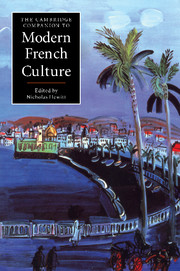Book contents
- Frontmatter
- Introduction: French culture and society in the twentieth century
- 1 Modern France: history, culture and identity, 1900-1945
- 2 Culture and identity in postwar France
- 3 Architecture, planning and design
- 4 The mass media
- 5 Consumer culture: food, drink and fashion
- 6 Language: divisions and debates
- 7 Intellectuals
- 8 Religion, politics and culture in France
- 9 The third term: literature between philosophy and critical theory
- 10 Narrative fiction in French
- 11 Poetry
- 12 Theatre
- 13 Music
- 14 The visual arts
- 15 Cinema
- Index
10 - Narrative fiction in French
Published online by Cambridge University Press: 28 May 2006
- Frontmatter
- Introduction: French culture and society in the twentieth century
- 1 Modern France: history, culture and identity, 1900-1945
- 2 Culture and identity in postwar France
- 3 Architecture, planning and design
- 4 The mass media
- 5 Consumer culture: food, drink and fashion
- 6 Language: divisions and debates
- 7 Intellectuals
- 8 Religion, politics and culture in France
- 9 The third term: literature between philosophy and critical theory
- 10 Narrative fiction in French
- 11 Poetry
- 12 Theatre
- 13 Music
- 14 The visual arts
- 15 Cinema
- Index
Summary
Introduction: towards a definition
The object of study that is both configured and analysed in this chapter is usually split into four categories: French literature (written in France), 'Francophone' or 'non-Hexagonal' productions (written in French outside of hexagon-shaped France) and within each field, a further separation occurs between canonical and popular literature. Because critical studies are often restricted to high culture, and have long treated France as the unquestioned centre of French studies, Francophone countries and popular literature are the vulnerable variables of the equation. In this chapter, we propose to redraw the disciplinary borders that have surrounded traditional fields ('popular culture', 'Francophone' and 'French' literatures) and focus on narrative fiction of French expression.
We do not pretend that France can arbitrarily be treated as just one Francophone area among others or that the distinction between high culture and low culture can be instantly abolished. The Hexagon has always had specific characteristics, notably a self-perception as the centre and point of origin. Even if we keep in mind regional cultures (Occitany, Brittany), France is a monolingual country whereas all other nations mentioned in this chapter will have French as one of their languages. In formerly colonised areas (North Africa, Sub-Saharan Africa, Vietnam, the Indian Ocean, the Caribbean) French has been associated with conquest and cultural domination. In yet other countries, French is a vulnerable cultural capital threatened by other expanding linguistic forces (English in Quebec for example).
- Type
- Chapter
- Information
- The Cambridge Companion to Modern French Culture , pp. 205 - 223Publisher: Cambridge University PressPrint publication year: 2003



